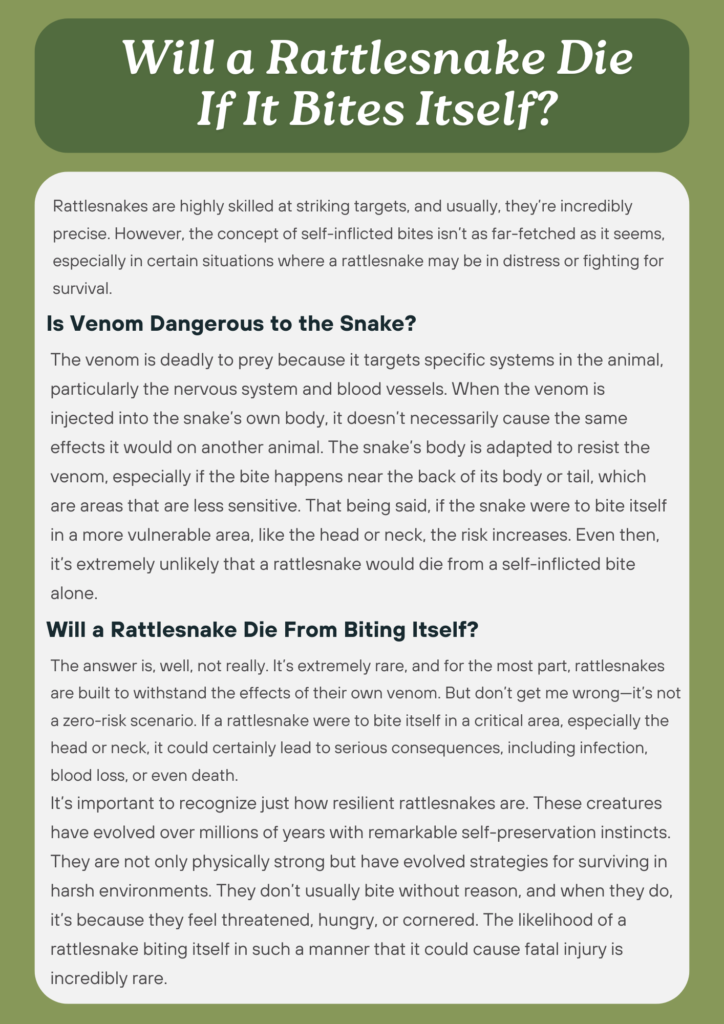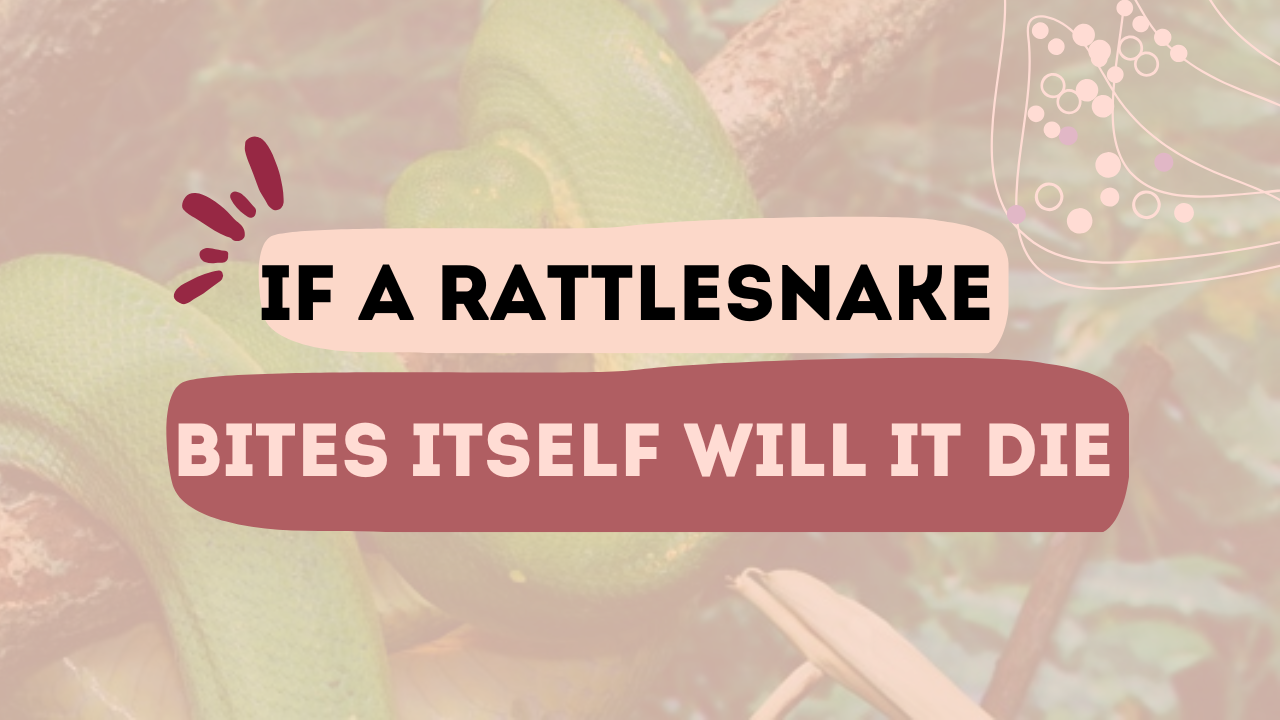When you think of rattlesnakes, you probably picture them striking at their prey with lightning speed or, you know, giving that signature rattle sound before you run for your life. But, have you ever stopped to think: what would happen if a rattlesnake were to bite itself? Would it die? It’s one of those odd, yet curious questions that makes you wonder about the life of these fascinating creatures. In this article, we’ll dive into whether a rattlesnake can actually harm itself in such a way that it would end up meeting its own end. And, believe me, there are some surprising answers ahead! So, buckle up, because this might not be the answer you were expecting.
The Anatomy of a Rattlesnake Bite
Before we can answer the big question, it’s important to first understand how a rattlesnake bite works. Rattlesnakes have sharp, hollow fangs that they use to inject venom into their prey when they strike. This venom is a cocktail of different enzymes and proteins designed to break down the prey’s tissues, making it easier for the snake to digest. It’s a terrifying weapon when used on prey, but could it be equally deadly if used on the snake itself?
Venomous Self-Defense? Does a Rattlesnake Bite Itself?
The idea of a rattlesnake accidentally biting itself sounds a bit crazy, doesn’t it? Rattlesnakes are highly skilled at striking targets, and usually, they’re incredibly precise. However, the concept of self-inflicted bites isn’t as far-fetched as it seems, especially in certain situations where a rattlesnake may be in distress or fighting for survival.
First off, we need to acknowledge that rattlesnakes don’t just bite anything. Their strike is usually a calculated action—either attacking prey or defending themselves from threats. However, in rare instances, a rattlesnake could inadvertently bite itself, especially if it’s agitated, disoriented, or startled. When you think about it, if a rattlesnake is frightened or in a confined space, there’s always a chance it might strike without proper focus or intention, which could lead to a self-inflicted bite.

The Venom: Is It Dangerous to the Snake?
Now, let’s talk about the venom itself. Rattlesnakes, like all venomous snakes, have evolved to withstand the effects of their own venom. This is a crucial survival feature because they need to be able to inject venom into their prey without harming themselves. But, here’s the catch: while a rattlesnake can handle its venom to a certain extent, it’s not invincible. A bite from a rattlesnake to itself could, in theory, cause harm, but would it actually be fatal?
The venom is deadly to prey because it targets specific systems in the animal, particularly the nervous system and blood vessels. When the venom is injected into the snake’s own body, it doesn’t necessarily cause the same effects it would on another animal. The snake’s body is adapted to resist the venom, especially if the bite happens near the back of its body or tail, which are areas that are less sensitive. That being said, if the snake were to bite itself in a more vulnerable area, like the head or neck, the risk increases. Even then, it’s extremely unlikely that a rattlesnake would die from a self-inflicted bite alone.
Will a Rattlesnake Die From Biting Itself?
So, here’s the million-dollar question: can a rattlesnake die if it bites itself? The answer is, well, not really. It’s extremely rare, and for the most part, rattlesnakes are built to withstand the effects of their own venom. But don’t get me wrong—it’s not a zero-risk scenario. If a rattlesnake were to bite itself in a critical area, especially the head or neck, it could certainly lead to serious consequences, including infection, blood loss, or even death. But these cases would be highly unusual and likely involve other factors, such as the snake’s overall health or pre-existing conditions.
In the wild, rattlesnakes are more likely to encounter other dangers that could harm them—like predators, accidents, or even exposure to disease. Biting themselves is way down the list of potential threats. So, while it’s possible for a rattlesnake to accidentally hurt itself, it’s not the usual way that a rattlesnake meets its demise.
The Survival Instincts of a Rattlesnake
It’s important to recognize just how resilient rattlesnakes are. These creatures have evolved over millions of years with remarkable self-preservation instincts. They are not only physically strong but have evolved strategies for surviving in harsh environments. They don’t usually bite without reason, and when they do, it’s because they feel threatened, hungry, or cornered. The likelihood of a rattlesnake biting itself in such a manner that it could cause fatal injury is incredibly rare.
Other Dangerous Self-Inflicted Injuries
While self-inflicted bites are unusual, it’s worth noting that rattlesnakes, like many animals, could potentially harm themselves in other ways. For example, they might get caught in traps, tangled in debris, or even injured during a fight with another snake. But these scenarios, again, are rare compared to the general dangers rattlesnakes face in the wild, like being preyed upon by birds of prey or larger mammals.
Can a Rattlesnake Survive Without Venom?
Another point worth discussing here is whether a rattlesnake would even be able to survive without venom. If it were to accidentally lose its venom (perhaps from biting itself and the venom being wasted), would it be able to survive? Surprisingly, yes! Rattlesnakes can live without their venom, but they would be at a significant disadvantage. Without venom, their ability to hunt and immobilize prey would be drastically reduced, so they would have to rely more on their physical strength and constriction abilities. But for most snakes, their venom is a crucial part of their survival strategy, and losing it would certainly make life more challenging.
Final Thoughts: A Rare Scenario, But Not Impossible
To wrap it up, it’s highly unlikely that a rattlesnake would die from biting itself. These creatures have evolved to withstand the effects of their own venom, and most of the time, they’re incredibly precise with their strikes. While it’s possible that a self-inflicted bite could lead to injury or even death in extremely rare cases, it’s not something you’d commonly see in nature. Rattlesnakes are built to survive, and biting themselves isn’t usually the cause of their downfall.
So, while the idea of a rattlesnake biting itself sounds a little weird and dramatic, it’s not a major concern in the life of these amazing creatures. The next time you’re out in the wild and you hear that rattle, just remember that the chances of this snake hurting itself in a fatal way are pretty slim. Keep your distance, respect the wildlife, and you’ll both go home just fine!

